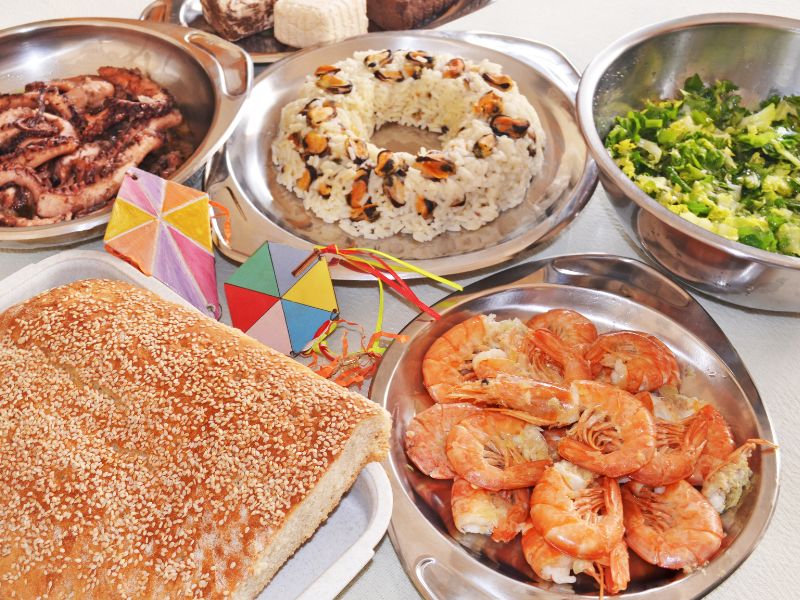
The delectable Greek vegan cuisine in Sarakosti is fantastic!
The Greek fasting period known as Sarakosti starts seven weeks before Easter Sunday and lasts for 40 days. The Greek Orthodox Church has been observing the Sarakosti custom since the fourth century.
Sarakosti may also be referred to as Kyra Sarakosti, Grecian lady lent, or lady lent. It is primarily a Grecian tradition. Greeks refrain from eating animal goods like meat, dairy, eggs, and fish during Sarakosti, except on the exception of the weekends. Sarakosti is a chance to enjoy time with family while reflecting on the significance of Christ's rising.
Sarakosti, what precisely is it?
It is a time for visiting church and abstaining from meals containing red blood (meats, fowl) and their derivatives (milk, cheese, eggs, etc.), as well as backboned fish and shellfish. Even olive oil and alcohol are forbidden on some days, while seafood is permitted on others, such as Palm Sunday (the Sunday before Easter).
Sarakosti is also ideal for sampling some delectable Greek veggie meals! There's something for everyone, from spanakopita (spinach pie) to ladera (vegetable stew eaten over rice or noodles). Sarakosti is a lovely method to exercise self-discipline while also celebrating Greek culture. It's an ancient custom that should be recalled and passed down to future generations!
Jesus Christ fasted and preached about the value of fasting, advising that it should be undertaken with joy and modesty and without condemning or judging others. Additionally, He gave His followers the advice that fasting should always be done in conjunction with meditation and should never be done in public so as to draw attention to oneself.
While purification of the body and spirit is the main objective of Sarakosti, it also places a strong emphasis on self-discipline in order to accept Christ's Resurrection, increased prayer and mindfulness as we consider and repent of our thoughts and actions, forgiveness as we are reminded of Christ's forgiveness and sacrifice on the Cross, gratitude for all that we have, and feeling a closer connection to God.
What dishes can you sample in Sarakosti that come from all over Greece?
During Lent, consuming meat is not permitted. Include foods and flavors like the typical "Ntolmadakia" (stuffed vine leaves), smoked octopus, fish roe salad, eggplant spread, sun-dried tomatoes, eggplant pickles, and caper leaves. Lasagna chips and Drapetsona Halva, a traditional treat for Lent! Once you've prepared the famous traditional Santorini fava, serve your appetizers with ouzo and raki (grape distillate)! We strongly advise you to travel throughout Greece and try the most conventional fasting diet, which reveals the most amazing Greek scents! Constantinople-style artichokes prepared with broad beans, onions, or carrots in the politan manner. Because the grape leaves are encased in herb-flavored rice rather than flesh, dolmadakia yialantzi is translated as "fake". lentils, beans, or black-eyed peas baked or used in soups. Pies with cabbage leaves, pickles, green onions, and other vegetables. dips prepared with fava split yellow pea purée and eggplant.
Even the bread is different on Clean Monday: It is known as Lagana and is unleavened. Lagana comes in flattish loaves that can be at least 60 centimeters (2 feet) long. This tempting Easter bread always has a few pieces taken out of one end when it is purchased straight from the bakery.
On Ash Monday and throughout Great Lent, dazzle everyone with your gifts for the Lenten season. Make the most conventional time of year a distinctive scent and taste.
Finishing up!
Overall, Sarakosti is a crucial component of Greek Orthodox religion and society. Greeks observe a vegan diet for the 40 days of Sarakosti in order to contemplate the significance of Christ's resurrection and to rejoice with their families. The delectable Greek vegan cuisine in Sarakosti is also fantastic! An antiquated custom called sarakosti should be preserved and passed down to future generations.
Embrace it!
